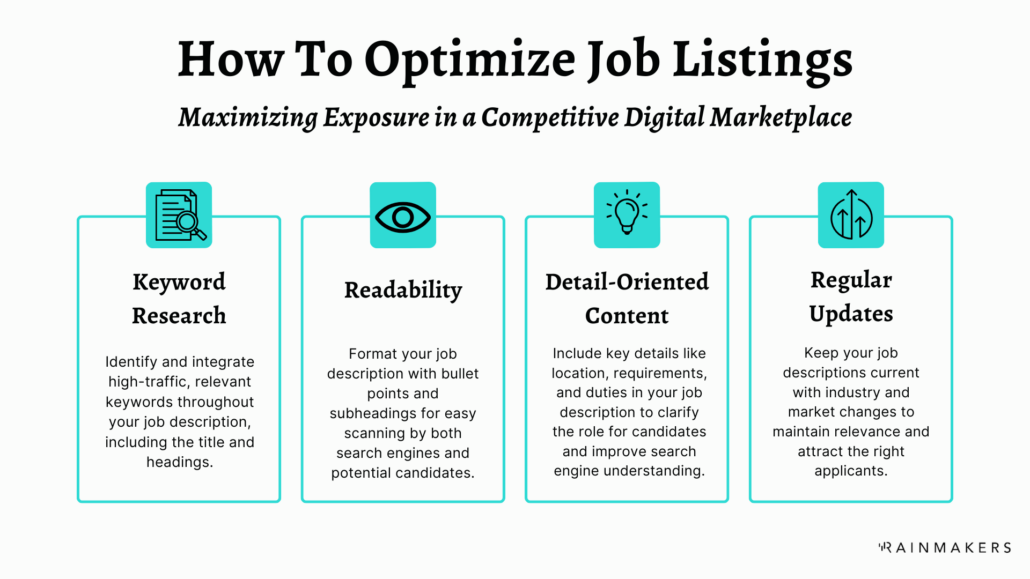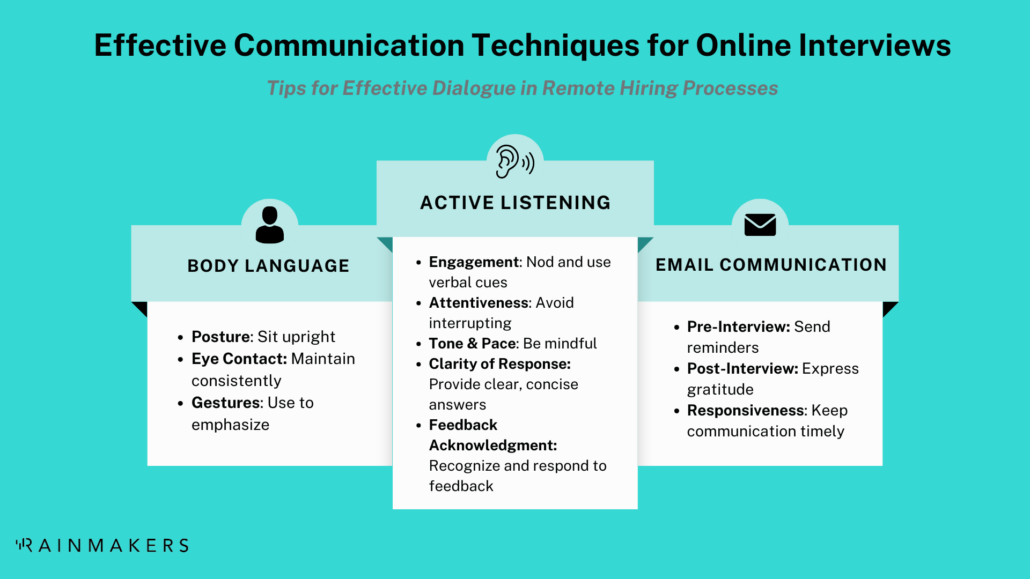Techniques for Engaging Potential Hires
Crafting compelling job descriptions is a critical part of the hiring process. How you present your available positions can significantly impact the quality and quantity of candidates who apply.
This article will discuss some tips for crafting job descriptions to attract the right candidates for your open positions. Whether you’re a seasoned hiring manager or new to the game, these tips will help you write job descriptions that engage and entice potential employees.
Key Elements of a Job Description
When writing a job description, you should include at least four elements: the title, duties, qualifications, and company information. Provided you have these four elements, your job description will be written in the right direction.
Below, you’ll find an example of how these four elements work:
Job Description Example
Job Title: Marketing Manager
Duties: The marketing manager will develop and implement marketing strategies to promote our products and services. This includes overseeing advertising campaigns, creating content for social media and company websites, analyzing market trends, and managing a team of marketing professionals. The marketing manager will also collaborate with other departments to ensure a cohesive marketing approach and will regularly report on the effectiveness of marketing efforts.
Qualifications: The ideal candidate will have a Bachelor’s degree in marketing or a related field and at least five years of experience in marketing management. Strong leadership and communication skills and a deep understanding of digital marketing platforms and analytics tools are essential.
Company Information: Our company is a leading provider of consumer goods focusing on sustainable and environmentally friendly products. We pride ourselves on innovation and quality and are committed to continuous improvement in all aspects of our business. This is an exciting opportunity to be part of a dynamic and forward-thinking organization.

Striking a Balance: Clear Yet Engaging Descriptions
When writing job descriptions, finding the perfect balance between clarity and creativity is key to attracting the right candidates. So, how can you strike that balance and create an outstanding job description?
First, start with a clear and concise summary of the role, outlining the key responsibilities and qualifications. Use bullet points to break up the information and make it easy to read. But don’t stop there. Inject some creativity by highlighting the company culture and the unique opportunities the position offers. Share a brief anecdote or quote from a current employee to give candidates a sense of working for your organization.
Next, consider the language you use. Keep it professional and straightforward, but don’t be afraid to infuse it with a touch of personality. Use active and engaging language that addresses the candidate and paints a vivid picture of what the role involves.
Finally, don’t forget about the benefits. Besides the standard perks, think about what sets your company apart and include it in the description. Whether it’s a flexible work schedule, a commitment to professional development, or a fun and inclusive work environment, highlight the unique selling points that make your company an attractive workplace.
By balancing clarity and creativity, you can craft job descriptions that attract attention and accurately represent the opportunities your company offers.

SEO for Job Descriptions
To ensure that your job listings get the visibility they deserve, optimizing them for search engine visibility is essential. Indeed, Glassdoor and LinkedIn are all job boards with a strong emphasis on search engines. Like Google, it helps to understand how to optimize your job description to appear at the top of search results. Here are some tips you can use:
1. Conduct keyword research
First, conduct thorough keyword research to identify the most relevant and high-traffic keywords related to the job position. Incorporate these keywords naturally into the job description, including in the content’s title, headings, and body. This will help search engines understand the relevance of your job listing to job seekers’ queries.
2. Make your job description easy to read
Ensure that the job description is formatted and structured for easy readability and comprehension. Use bullet points and subheadings to break up the content and make it more scannable for search engines and human readers. Potential applicants won’t proceed if you present them with a wall of text.
3. Be detailed in the description
Include relevant details about the job, such as location, requirements, and responsibilities. This helps potential candidates understand the role better and provides search engines with more context to index and rank the job listing accurately. Think about what your applicant might prioritize.
4. Keep your descriptions up to date
Regularly review and update your job descriptions to align with any industry or job market changes. Keeping the content fresh and relevant can improve visibility and attract more qualified candidates to your job openings. You can do this even if the job isn’t open by setting aside a document you can copy and paste if the job is open.

Showcasing Company Culture
When you’re attracting job seekers to your open positions, you want to be sure that the right seekers apply. You need to showcase your company culture in your job description to encourage those most desirable job seekers. However, the company culture needs to apply to how that might affect an employee’s life in your organization.
Below is an example of this in action:
Company Culture Job Description Example:
In our company, we believe in fostering a culture of collaboration, innovation, and continuous learning. Our team comprises individuals who are passionate about making a positive impact and strive to push boundaries in their respective fields. We value diversity and inclusion, recognizing that different perspectives and backgrounds drive creativity and success.
As we continue to grow, we are seeking like-minded individuals who embody our values and are committed to contributing to our dynamic work environment. Our ideal candidates are team players eager to learn, adapt, and contribute to our collective success. We are committed to providing our employees with opportunities for growth, recognition, and work-life balance, and we prioritize creating a supportive and empowering work culture.
We are dedicated to making a difference in the world and are looking for individuals who share our passion and ambition. If you are driven, collaborative, and eager to make an impact, we invite you to explore our opportunities and consider joining our innovative and forward-thinking team. Together, we can achieve our shared goals and make a difference in the world.

Writing for Inclusivity
When crafting job descriptions, using inclusive language that appeals to a diverse candidate pool is crucial. Here are some tips you can keep in mind when writing for inclusivity:
1. Avoid terms that exclude specific groups
Start by avoiding gender-specific terms like “salesman” and opt for neutral terms like “sales representative.” Be mindful of using language that may unintentionally exclude certain groups, such as requiring a “strong command of the English language” when the job doesn’t inherently require it.
2. Highlight your commitment
Highlight the company’s commitment to diversity and inclusion in the job description to signal candidates that the organization values various perspectives and experiences. Emphasize the company’s support for diversity initiatives and its commitment to creating a welcoming workplace.
3. Get your staff to review it
Ask your current staff to review your work for inclusivity. Be sure to ask members of your staff who are part of these groups if they are familiar with discrimination. These people will know first-hand what it’s like to have a job description that wasn’t written for them and likely have some ideas on how to improve it.
By following these best practices, you can create job descriptions that speak to a wide range of candidates and attract a diverse talent pool to your organization.

Avoiding Common Job Description Mistakes
When creating job descriptions, there are common pitfalls employers can fall into. If you want to avoid these mistakes, here are some common mistakes to avoid:
- Go beyond the typical laundry list of qualifications and responsibilities.
- Avoid using overly technical jargon that may alienate potential candidates.
- Focus on using a conversational and engaging tone that addresses the reader.
- Avoid asking for an unreasonable amount of experience or a laundry list of qualifications that may deter qualified candidates from applying.
- Focus on the core skills and experience necessary for the role while keeping an open mind about additional skills that can be learned on the job.
- Highlight the company culture and values and the potential for growth and development within the role.
By avoiding these common job description mistakes, you can attract a wider pool of qualified candidates and set the stage for a successful hiring process.
Wrap Up
Writing engaging job descriptions is a great way to attract top-tier job seekers. The right job description can connect with more thoughtful job seekers who focus on things like culture fit and working with those who give as much as they get. But a good job description isn’t enough if you want to take extra steps to ensure you get excellent applicants.
Rainmakers is the perfect platform for employers to find top-tier job sales candidates. We provide information on how salespeople hit quotas, how they sell, and who they sell to. To learn more, sign up for an account today.
















